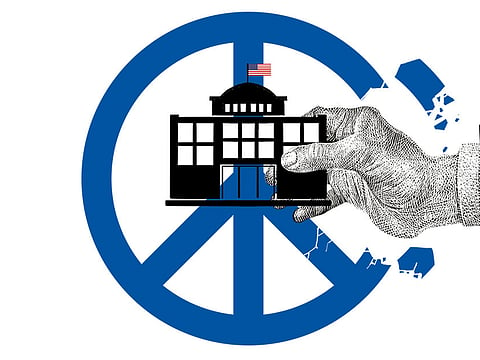Jerusalem move can unleash violence
Trump’s plan to move the US embassy is fraught with risk as it will torpedo the administration’s own peace plan

Even in the midst of breaking news last week about the indictment of former United States national security adviser Michael Flynn on a felony charge, the retweet by the American president of far-right Britain First anti-Muslim videos, and the struggle by the Republicans to muscle their tax bill through Congress, the American media still gave major coverage to the debate over occupied Jerusalem. US President Donald Trump declared that he might move the American embassy in due course, a startling reversal of the position of previous administrations — and indeed that of the international community as well — effectively naming the city, in its entirety, East and West, as Israel’s capital.
Trump was expected to formalise his intention to do just that, later last night. This is a dangerous gambit — and I cannot think of any other adjective here — that will not only torpedo the administration’s own peace plan (“the ultimate deal”) and threaten America’s long-standing role as a putative “honest broker”, but also inflame passionate opposition, in one form or another, by 25 per cent of the global population, who happen to be Muslim.
As if to underscore the point, in a late-night call on Sunday, Jordan’s Foreign Minister, Ayman Safadi, warned US Secretary of State Rex Tillerson that such a decision could “trigger anger across the Arab and Muslim world, fuel tension and jeopardise peace efforts”. In every sense of the word, Safadi was echoing the sentiments of regional leaders, as well as those of the 57-member states of the Organisation of Islamic Cooperation (OIC), whose people will see it as the last straw that will break the proverbial camel’s back.
Occupied Jerusalem, you see, is not an issue that exclusively concerns Palestinians, but one of paramount spiritual significance to the 1.8 billion Muslims around the world to whom, though it is an earthly city, burdened with political problems, it is also a city that bears an added, celestial burden — it is holy, and equally so to three great religions. Its fate resonates at the very core of every Muslim’s teleological spirit of human being.
Throughout history, those who thought they could sustain an exclusivist presence in it, or control over it, by force of arms, found themselves running a fool’s errand. Look at what happened to the Crusaders, who had established there a closeted Kingdom in 1099 — after butchering virtually the entire indigenous population, including native Christians. They found themselves expelled 88 years later. It should have been obvious then, as it is explicitly clear now, that it is the pluralistic, not exclusivist, sentiment that constitutes the major building block of stable social formation.
Trying to explain that today to Israeli leaders, who are propelled by their messianic vision of “Eretz Israel” — trying, as it were, to sweet-talk them into a rationally equitable peace settlement — is like trying to put out a fire with oxygen.
Back to Trump and his clearly provocative stance on the Holy City. The question here is this: Why would he overturn decades of consensus by his predecessors in the White House, not to mention the international community, that any change to Jerusalem’s status, the thorniest issue in the conflict, must come as part of a negotiated settlement?
In an opinion piece for CNN last Monday, Aaron David Miller, Distinguished Scholar at the Woodrow Wilson International Centre for Scholars, and a former Middle East negotiator for Democratic and Republican administrations, wrote: “Having worked for the State Department on Arab-Israeli negotiations for the better part of a quarter century, I came up with more than my share of half-baked ideas. But the one issue I was smart enough — and advised every secretary of state to do the same — was occupied Jerusalem. My advice was simple: Don’t play with the most sensitive and volatile issue in the negotiations. And yet President Donald Trump is preparing to do precisely that.”
Miller’s warning is cogent. As we’ve seen in the past, any change in the status quo could trigger violence
Folks, fasten your seat belts. Bumpy ride ahead.
Fawaz Turki is a journalist, lecturer and author based in Washington. He is the author of The Disinherited: Journal of a Palestinian Exile.



